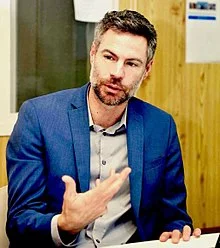The Joe Rogan Experience #1963 – Michael Shellenberger & Joe Rogan

Michael Shellenberger
Michael Shellenberger, an influential environmentalist and policy expert, has been a prominent advocate for pragmatic solutions to global challenges. As the founder of Environmental Progress, Shellenberger has championed the use of nuclear power as a clean energy alternative, pushing for a sustainable future. Named a "Hero of the Environment" by TIME Magazine in 2008, his expertise on climate and energy policy has garnered international recognition. Michael's bestselling book, "Apocalypse Never: Why Environmental Alarmism Hurts Us All," offers a refreshing, fact-based perspective on environmental issues, debunking common myths and misinformation. A sought-after speaker and thought leader, Shellenberger has contributed to leading publications like Forbes and The New York Times, informing public discourse on energy and environmental policy. Michael Shellenberger's innovative ideas and dedication to sustainable solutions have made him a key figure in shaping the future of environmental progress.
Books Mentioned in JRE #1963 - Michael Shellenberger & Joe Rogan:
The Joe Rogan Experience #1963 - Michael Shellenberger: A Deep Dive into Climate, Energy, and Environmental Policy
The Joe Rogan Experience #1963 features Michael Shellenberger, a prominent environmentalist, policy expert, and author of the bestselling book, “Apocalypse Never: Why Environmental Alarmism Hurts Us All.” In this episode, Joe Rogan and Michael Shellenberger engage in an in-depth conversation about climate change, energy, environmental policy, and the potential solutions to address these pressing issues.
Climate Change: Facts and Misconceptions
A. The Realities of Climate Change Shellenberger emphasizes the importance of understanding the facts about climate change, including the role of human activity in contributing to rising global temperatures, extreme weather events, and other consequences. He argues that while climate change is a serious issue, alarmism and misinformation can hinder effective policymaking and public understanding.
B. Debunking Climate Myths Michael Shellenberger debunks various climate myths, including exaggerated claims about species extinction rates, the impact of natural disasters, and the likelihood of climate refugees. By addressing these misconceptions, Shellenberger aims to create a more accurate and nuanced understanding of climate change and its implications.
The Role of Nuclear Energy in Combating Climate Change
A. The Benefits of Nuclear Power Shellenberger champions nuclear power as a clean, reliable, and safe energy source that can help combat climate change. He highlights its low carbon emissions, high energy density, and ability to provide consistent power generation, unlike intermittent renewable sources like solar and wind.
B. Overcoming Public Fears and Misconceptions Michael and Joe discuss the public’s fears and misconceptions surrounding nuclear energy, particularly concerns about radiation and waste disposal. Shellenberger explains that the risks associated with nuclear power are often overblown and that modern nuclear technology has made significant advancements in safety and efficiency.
The Importance of Pragmatic Environmental Policies
A. Balancing Economic Growth and Environmental Protection Shellenberger stresses the need for pragmatic environmental policies that balance economic growth with environmental protection. He argues that wealthier countries are better equipped to invest in clean technologies and protect their natural resources, making economic development a crucial component of environmental progress.
B. The Role of Innovation in Environmental Solutions Michael highlights the importance of innovation in driving sustainable solutions to environmental challenges. He mentions breakthroughs in nuclear technology, renewable energy, and carbon capture as examples of how human ingenuity can help address climate change and other environmental issues.
Debating the Green New Deal and Other Policy Proposals
A. Critiquing the Green New Deal Shellenberger offers a critique of the Green New Deal, expressing concerns about its feasibility, cost, and effectiveness in addressing climate change. He argues that the plan’s focus on renewable energy sources is misguided and that it overlooks the potential benefits of nuclear power.
B. Alternative Policy Approaches Michael Shellenberger proposes alternative policy approaches that prioritize investments in clean energy research and development, particularly nuclear power. He suggests that policies should encourage international cooperation, enabling countries to share knowledge and resources to combat climate change more effectively.
The Impact of Environmental Alarmism
A. Psychological Consequences Shellenberger and Rogan discuss the psychological consequences of environmental alarmism, particularly its impact on younger generations. They highlight the anxiety and hopelessness that can result from constant exposure to doom-and-gloom messaging and emphasize the importance of presenting a balanced view of environmental challenges and potential solutions.
B. Hindering Productive Conversations Michael argues that alarmist rhetoric can hinder productive conversations about climate change and environmental policy. By focusing on extreme scenarios and apocalyptic outcomes, alarmism can polarize public opinion and prevent the development of effective, consensus-based solutions.
The Future of Environmentalism and Climate Action
A. Building a Rational Environmental Movement Shellenberger envisions a more rational environmental movement that embraces science, technology, and innovation to address climate change and other environmental issues. He emphasizes the need for balanced, evidence-based discussions and policies that consider a range of potential solutions.
B. The Path Forward As the conversation concludes, Michael Shellenberger remains optimistic about humanity’s ability to tackle climate change and protect the environment. He believes that by prioritizing innovation, collaboration, and pragmatic policies, we can create a sustainable future for generations to come.
Conclusion
In The Joe Rogan Experience #1963, Michael Shellenberger offers valuable insights into climate change, energy, and environmental policy. Throughout the discussion, he emphasizes the importance of understanding the facts, debunking misconceptions, and embracing innovation to develop effective solutions to pressing environmental challenges. Shellenberger’s pragmatic and rational approach to environmentalism, combined with his advocacy for nuclear power and evidence-based policies, provides a fresh perspective on the global climate conversation. By encouraging open, informed dialogue and prioritizing collaboration, this episode highlights the potential for meaningful progress in the fight against climate change and the pursuit of a sustainable future for all.










